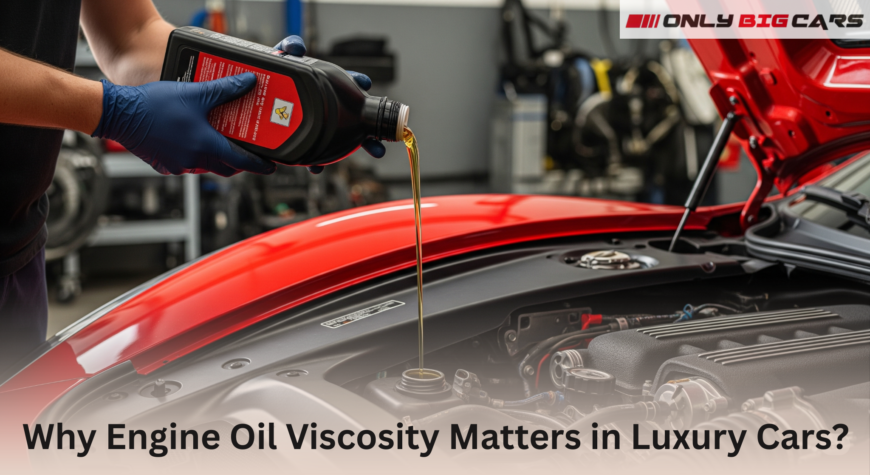When it comes to maintaining a luxury car, every small detail matters. From regular service schedules to selecting the right components, everything contributes to how well your vehicle performs. One such critical aspect — often overlooked, is engine oil viscosity.
If you’re a proud owner of a BMW, Mercedes-Benz, Audi, Porsche, or any other high-end vehicle, understanding oil viscosity is key to protecting your investment. This blog will explain what engine oil viscosity means, why it matters, and how to choose the right one for your luxury car.
What is Engine Oil Viscosity?
In simple words, viscosity refers to the thickness of the engine oil or how easily it flows at different temperatures. Think of it like honey and water — honey is thicker and flows slower than water, so we say honey has higher viscosity.
Engine oil works the same way. A low-viscosity oil flows more freely, while a high-viscosity oil is thicker and flows more slowly.
Understanding the Oil Grade (e.g., 5W-30)
You’ve probably seen numbers like 5W-30 or 0W-20 on oil containers. This is a multi-grade rating that tells you how the oil behaves in both cold and hot temperatures:
- “5W” – The “W” stands for winter. This part of the rating shows how the oil performs in cold weather. The lower the number, the better the flow in cold starts.
- “30” – This shows the oil’s thickness at the engine’s normal operating temperature.
For example, 5W-30 oil flows well in both winter and summer, making it a versatile choice for many luxury cars. Using premium-grade synthetic oil is non-negotiable for luxury cars, as it maintains viscosity stability under extreme conditions.
Why Engine Oil Viscosity Matters for Luxury Cars
Luxury cars are engineered with precision. Their engines run at tighter tolerances, higher compression ratios, and often use turbochargers or high-performance parts. All of these demand a high-quality, well-matched engine oil.
Here’s why viscosity is vital:
- Proper Lubrication
The right oil viscosity ensures that moving parts like pistons, valves, and crankshafts are well-lubricated. Too thick, and the oil won’t flow quickly. Too thin, and it won’t protect the engine properly.
- Cold Starts Protection
Luxury cars often have advanced engines that can be affected by cold starts. A low “W” viscosity oil flows easily when the engine is cold, reducing wear during startup.
- Heat Resistance
Engines in performance cars generate more heat. A higher second number in the viscosity rating (like 40 or 50) ensures the oil stays thick enough to protect the engine even at high temperatures.
- Fuel Efficiency
Using oil with the correct viscosity helps reduce friction, which improves fuel efficiency — something important even for luxury vehicles.
- Engine Longevity
Correct oil viscosity reduces wear and tear, keeps the engine cleaner, and helps maintain overall engine health over time.
How to Choose the Right Oil Viscosity for Your Luxury Car
- Refer to the Manufacturer’s Manual
Every luxury vehicle comes with a recommended viscosity grade. This is based on how the engine was designed and the local climate conditions. Following the manufacturer’s recommended luxury car service intervals ensures your engine oil viscosity stays within safe limits.
- Consider Your Driving Conditions
- If you drive in extremely hot or cold climates, choose oil that performs well in those temperatures.
- For city traffic with frequent stopping, oil with better thermal stability (higher viscosity at high temp) is better.
- Check for Certifications
Always choose oils with API or ACEA certifications and those specifically designed for luxury or high-performance cars.
Common Engine Oil Viscosity Grades and What They Mean
Viscosity Grade | Best For |
● 0W-20 | Very cold climates, new luxury models |
● 5W-30 | Balanced performance, common in BMW, Mercedes |
● 0W-40 / 5W-40 | Turbocharged or high-performance engines |
● 10W-60 | Sports cars, racing use, very high-temp resistance |
Signs You’re Using the Wrong Oil Viscosity
- ● Hard engine starts
- ● Excessive engine noise
- ● Overheating
- ● Decreased fuel economy
- ● Reduced engine performance
If you notice any of these, get your oil checked and replaced if needed.
Conclusion: Don’t Compromise on Oil Viscosity
Engine oil viscosity might sound technical, but it plays a huge role in the performance and protection of your luxury car. By using the right viscosity, you ensure smoother rides, better efficiency, and a longer engine life.
So next time you go for an oil change, don’t just pick any oil — choose the right oil viscosity for your luxury vehicle and keep it running like new.
Engine Oil Viscosity FAQs
Repairs & Servicing















































